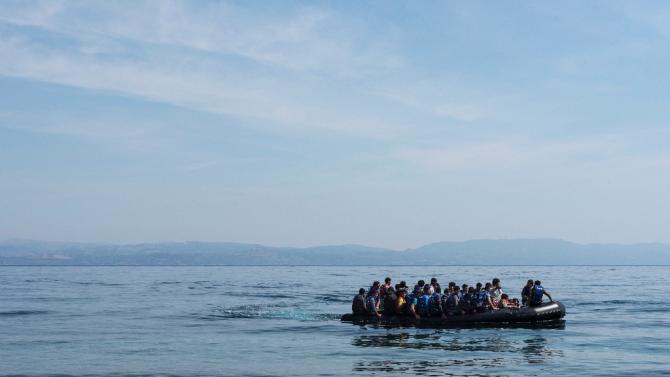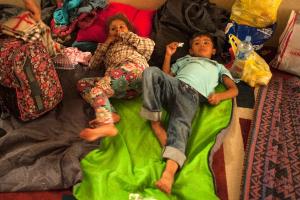Date: Wed, 2 Sep 2015 21:42:39 +0200
Tirana (AFP) - With Europe struggling with a record influx of refugees, would-be migrants from the Balkans are taking desperate measures to 'prove' their lives are threatened in the hope of securing a successful asylum claim.
Since January, more than 300,000 refugees and migrants have made their way to Europe's shores, UN figures show, many of them risking their lives to flee war and persecution in the Middle East and Africa.
But among the human ride flooding into Europe is a large number of people from conflict-free countries in the Balkans who are looking to escape the region's poverty and high unemployment rates.
In Germany, official figures show 79,000 Serbians, Kosovans and Albanians sought asylum in the first seven months of the year, up from 19,500 in the same period in 2014, making them the second largest group after Syrians.
But with many driven by economics rather than persecution, few are successful in obtaining asylum, with only 0.2 percent of German claims approved.
As vast numbers surge towards Europe with the hope of claiming asylum, a brisk trade in false Syrian passports has emerged among economic migrants, the EU's Frontex border agency said this week, saying it was common knowledge that Syrians can get asylum anywhere within the 28-member bloc.
In Albania, increasingly-desperate migrants are resorting to reckless and dangerous measures in order to 'prove' their lives are at risk, police say.
In one case, a 35-year old man placed explosives under his own car simply to obtain a police report showing his life was in danger, police spokesman Ardi Bide told AFP.
"He managed to leave for Germany before the end of the probe that established that it was him setting up the whole thing," he said.
Others put explosives outside their own front doors to prove they are at risk from a blood feud or a vendetta - a centuries-old tradition which is still widely observed in the country's mountainous north, sparing no male in a family, not even babies.
- 'Desperation' -
Another police expert said some people even pay for an article or interview in the Albanian media or on social networks in which they speak of a threat in order to prove their lives are in danger.
Such an article can serve as a reliable document for EU officials examining an asylum claim, he said.
Proof is key to having a claim accepted, explains Bide.
"It is necessary to prove that a life is in danger in the country of origin," he told AFP.
Others are prepared to pay to get the necessary documentation they believe will secure them an asylum claim, like Marushe, a widow in her 30s who lost her job and was forced to sell her house in order to make ends meet.
But it wasn't enough.
"I paid 400 euros to the mayor of my municipality who gave me a certificate for my two children, 10 and 11 years old, stating that they would be victims of vendetta in Albania," she told AFP.
Moving to Germany to find a job is her only hope.
"The desperation makes you do illegal things," she shrugs.
Nikoll Shumani of the Association of Missionaries for Peace, says for months the group has been bombarded with around 40 requests per day for certificates proving a family or individual was in danger.
- 'Tough news' -
Germany has described the number of economic migrants arriving from the Balkans as “unacceptable” with Chancellor Angela Merkel warning they would not be granted asylum.
The "tough news.. is that people from these countries who apply for asylum will highly likely have to return home so that we can help the people who really are suffering with war and persecution," she told Balkans leaders in Vienna last week.
Since January, around 13,000 Kosovans have been repatriated, mainly from Germany, Kosovo's interior ministry says. Over the same period, another 13,400 Albanians have been sent back home from various EU countries, officials say. Serbian figures were not available.
But such warnings have done little to stem the tide of people seeking a better life in northern Europe, whose desperation is often exploited by criminal gangs.
"The phenomenon is directly linked to the interests of criminal groups who make a huge profit and therefore incite such departures," Albanian police chief Haki Cako told AFP.
Albanian officials are looking to set up a regional information-sharing hub to tackle the phenomenon, he said.
The plan would involve a "joint centre for exchange of information in the Balkans and joint operations of Balkans countries, as well as better exchange of information between the Balkans and the EU in order to fight the flow efficiently," he said.
Former Albanian economy minister Arben Malaj believes the only solution is if Europe "invests in the Balkans and supports the fight against poverty" there.
Albanian political analyst Aleksander Cipa says Europe needs to take a broader strategic approach to address the underlying cause of the problem.
"Europe needs to turn towards the Balkans countries as a common market and not to see them as a problem. Europe should have a strategic view of the Balkans' future" in order to improve living conditions that would make people stay, he said.


